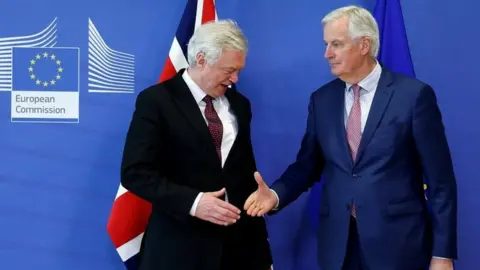Brexit: Deal is done - but work remains
 Reuters
ReutersThe deal is done, the pound has been climbing; forget the snow, only sunshine and clear skies ahead for Brexit.
The two hardy political mountaineers have scaled the heights. David Davis and Michel Barnier, representing the UK and the EU, have agreed in principle to the transition deal, or implementation period (whatever you want to call it) - a period of 21 months where the two sides can work out the finer details of the relationship that will evolve over many, many years.
The sighs of relief from No 10 will be so loud they'll be heard in Brussels. The government has something they can say is an agreement, which means progress, and they hope it's an insurance policy against business pulling up stumps and abandoning the UK as the uncertainty around Brexit threatens their ability to make plans.
"Hang on," I rightly hear you say. It is not, that simple.
Yes, the EU and the UK have hammered out a political agreement on what happens as soon as we leave the European Union next year. The short answer is, as the prime minister conceded back in Florence in September, not very much.
And during that period the UK will pay significant amounts of cash for the status quo. But there are three big questions about what has been agreed.
First: As ministers have been perfectly well aware for a long time, there have had to be compromises to get this far. The EU has bent in some areas true, but the UK has done more of the budging. As we reported a few weeks ago for example, the UK's original hope to make big changes to EU immigration during the transition period, has gone. The UK has agreed the EU's preferred date of finishing the implementation period at the end of 2020, rather than spring 2021. And in the next few hours the text of today's Brussels statements will be scoured to see where else the big concessions have come.
Second: What is left to resolve? The answer is, a lot. The original plan for the first phase of the talks was to resolve citizens' rights, Ireland and the divorce bill. Well, the cash and citizens' rights are done. That is of course, an achievement of its own. But there is no sign of agreement on the Irish issue, and the UK has had to agree that the controversial backstop remains to solve the problem if everything goes wrong. And this stage is, remember, only about how we leave - the divorce proceedings not the final agreement that will determine how the UK does business with the EU in the decades to come. This is an important step that is highly likely to be rubber stamped later this week, but it ain't over.
Lastly: How politically acceptable are the fudges agreed so far at home? David Davis has got his "joint committee" that will police the implementation agreement. No 10 hopes this will ease concerns that the UK will essentially have to abide by the EU rules without much of a say - to use the terrible jargon, to be a "rule-taker not a rule-maker". But it is not certain that guarantee will be enough on the Tory backbenches to end claims that the transition will leave us a "vassal state". And on fishing for example, there is disappointment already that the government has agreed to concede some sovereignty on UK waters during the implementation period that might give rise to demands for a tougher approach in the next part of the negotiations. Don't be surprised for one moment if there are plenty of Brexiteer mutterings that "nothing is agreed, until everything is agreed".
Today though the government will trumpet the fact they have come this far.
Expect ministers to hail the agreement on transition as evidence that Brexit is on track, and to big-up what they see as achievements in the talks - the UK will be able to sign and ratify trade agreements in the transition period for example, to be ready to come into force at midnight on 31 December 2020.
But the agreement has been possible because some of the hard bits have been parked. This a long, a very very long, game.
